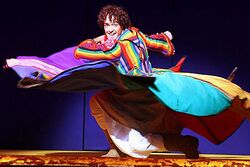Joseph and the Amazing Technicolor LSD Trip
One of Andrew Lloyd Webber's most famous works, Joseph and the Amazing Technicolor LSD Trip is set in 1970's Glasgow. The musical was inspired by a pleasant Scottish family that Lloyd Webber met on his annual holiday in Blackpool. Here is an outline of what is arguably one of the world's greatest and most flamboyantly homosexual musicals.
Act One[edit]
Humble Beginnings[edit]
The male protagonist in the show is, of course, a young man named Joseph. He lives in a house on one of the poorer Glaswegian council estates with his father and eleven brothers - results of an unfortunate line of failed marriages, one night stands and inevitable maternal suicides. As the only child who has yet to receive a court sentence for petty theft, vandalism or drunk and disorderly conduct, Joe holds a special place in his father's heart from the beginning of the show.
The Brothers Get Their Own Back[edit]
As you can imagine, this blatant favouritism did not sit well with the rest of the family. The result is that the tragic hero finds himself clinging to the edge of a manhole cover for dear life as his drunken brothers stamp on his fingers. The iconic "We Do Nae Fookin' Need Ye, Wee Shit" is performed at this point, a popular sing-along with audiences the world over. When the song is finished the youngest brother Ben suggests that they tie Joe up and bundle him on a train, never to be seen again and leaving the rest to impress their father with the ability to drink twenty seven pints without falling over. Needless to say, our hero is gone before sunrise.
The train sets the scene for Joseph to perform his powerful solo "I Cannae Believe I'm Gettin Oot Of There", full of hope for a brighter future in London, where he is now bound.
Act Two[edit]
London[edit]
Greeted at King's Cross Station by a portly businessman who mistakes Joseph for the assistant he has just hired from Edinburgh, the lucky young man is whisked away to Mr Potiphar's estate on the West Side, leaving a smartly dressed Mark Macdonald bemused at the station. He spends many a happy month licking envelopes, making coffee and ogling the boss's wife before running into a few shady characters at a local nightclub. The scene is set for "Tell Us What It's Like Not To Be High" - a psychadelic disco romp. It doesn't take much coercion for our naive Joe to give in to temptation and promises of a "totally wild time" and he is soon off on the trip of a lifetime.
The Trip[edit]
Almost the entirety of the rest of the act is taken up with pyrotechnics, cleverly disguised wires and lasers.
During his LSD trip Joe traverses the now sparkling, multicoloured streets of London for around ten minutes before a vision of his boss, Potiphar, appears floating before him. He tells Joe that, if only he can get a high enough take off, he too can fly. This scene has been linked to triggering schizophrenia in some, though this link remains unproven and investigations no longer continue.
Trivia[edit]
- The first person ever to play the much sought-after part of "Purple Canary 1" in this act was French actor and poet Jean-Pierre Charles Delacour. After his astounding first performance he deemed the rest of his life not worthy to be lived and committed suicide in spectacular fashion during the final scene. A quick-witted prop man - Dan Jameson - managed to lower a wooden gingerbread house over him before the audience saw and mass hysteria broke out.
- In the original script this scene ended with Joseph suspended upside down from a wire as Potiphar's laughter echoed from the theatre's speakers. The scene then faded to black, the echo still going on. This ending was rewritten in 1992 after six audience members were placed in a mental health care facility, claiming to hear the laughter wherever they went. In the revised ending, Joseph is suspended in front of a spiralling background until the lights fade out, minus the laughter.
Finale[edit]
The final scene opens with a bright white light and a clean hospital scene, where we see gathered the eleven brothers and Joseph's father. "How Little We Ken Aboot Ye Noo" was given tearful reviews in every newspaper excluding The Sun, which merely pondered "How the hell did they all get there so fast?".
As Doctor 1 (first played by Reginald Boorswipe) begins to list young Joe's injuries, he is interrupted by the sound of flatlining heart monitor - Joseph is dead. The musical ends with the family leaving, shaking their heads sadly, followed by Nurse 3 switching off the lights with a loud click.
To Conclude[edit]
Andrew Lloyd Webber is disgusted that people have taken from this work the moral that young people should not take drugs, as it only leads to death. He recently issued the following statement:
| “ | You people think what? That's bullshit! When I wrote Joseph I wanted to tell the world about the merits and emotional fulfilment of working with disadvantaged children. Whether you take drugs or not, frankly, is none of my damn business. So if you're all so selfish as to think that I want to address you personally through theatre, I hope you rot in Hell. | ” |
